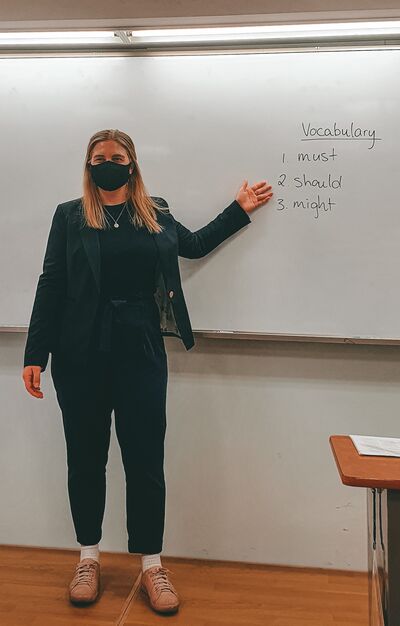A Day in the Life of an ALT on the JET (Japan Exchange and Teaching) Programme

The unofficial motto of the JET Programme is 'every situation is different (ESID).' This is completely true, and every JET's day looks different depending on whether they work in a public or private school, whether they have co-JETs or are solo, their teaching partner's style, and the school's schedule. I teach in a private junior and senior high school in central Tokyo, where students are aged 12-18. The following is my own experience, but every ALT's (assistant language teacher) experience on the JET Programme is vastly different.
Table of Contents
Wake up, get ready for school and commute to school 6:30 - 7:50
Are you ready to teach English in Japan?
Check out what our course grads say in our many video testimonials!
Wake up, get ready for school and commute to school 6:30 - 7:50
In Tokyo, almost everyone commutes via train, and depending on where you live, your commute could take any length of time, although most JETs try to live fairly close to their school. My train commute is about 30 minutes while walking to school takes about 45 minutes.
Home room: 8:10 - 8:30
Students arrive at school around 8:00, and the first bell for homeroom rings at 8:10. If you are assigned to a specific class as an assistant homeroom teacher, you may have to attend homeroom. If you are assigned to a year level, you usually won't have to attend homeroom, or if you do, it will be to conduct morning revision quizzes in English.
Periods 1-4
Period 1: 8:40 - 9:30 Period 2: 9:40 - 10:30Period 3: 10:40 - 11:30 Period 4: 11:40 - 12:30
Each period in my school is 50 minutes long with a 10 minute break in between each class.
You can teach up to 5 lessons per day on a busy day, on a slower day, 3 lessons. These lessons can be structured in a multitude of different ways, from co-teaching to lead-teaching, and in other classes, the teacher might only ask you to come for the first/last 20 mins to run a review game or do speaking practice. It totally depends on the teacher you are working with as to what your duties in the class will be. It's nice to have variety though, as every lesson is different.
You will have at least 1 spare period per day, usually more, and depending on your role in the classroom, you may or may not have preparation to do in these spare periods. With some teachers, you may be assigning and marking short English essays every week and running entire classes, while with others, you may not need to do any preparation at all. There can be a lot of downtime as an ALT or 'desk-warming' as it is fondly named, where a lot of JET teachers choose to study Japanese, start a masters course, read, or work on their own projects like blogs.

Lunch time 12:30 - 13:10
Because my school is an inner-city school, most teachers buy their lunches from a nearby bento shop, bakery, or 7/11 or bring their own lunch and eat at their desks. Some teachers also order lunch from the cafeteria. If you are assigned to a junior year level, you will be rostered on to monitor them during lunchtime a few times per week, where you can either eat with the students or wait until you release them and eat in your staffroom. Teachers assigned to junior 1st year are provided with the same bento lunch as the students. If you are monitoring lunch, you will be there for around 20 minutes before you can return to your staffroom for the remainder of the lunch break.
Periods 5-7
Period 5 13:10 - 14:00Period 6 14:10 - 15:00Period 7 (not every day) 15:10 - 16:00
The periods after lunch can be tough to teach because the students are tired and often try to sleep in class. It is up to you as the teacher as to whether you wake them or not. Periods 5 and 6 are compulsory for every year level, and each year level only has period 7 on certain days.
After school 16:00 - 16:30
JETs at my school are required to stay until 16:30 when they can clock out, but after school can be quite a busy time. Students will often visit teachers after school to have their English speeches checked, do Eiken test practice (an external English proficiency test), or to do general conversation practice. Club activities are a huge deal in Japan, and students will often be practicing their club activities until 6:00 pm at night. Many JET teachers are involved in club activities and might be asked to supervise or coach a club activity.

Saturdays
Most private schools in Japan also have classes on Saturdays, so the teachers and students have a 6-day school week. However, JETs are protected by their contract and only work five days per week (or four days/week for public school JETs) as negotiated with their school. I work Tuesday - Saturday every week. My school only has half days on Saturday, and I am only required to work from 8:10 - 12:30 because my days during the week are slightly longer, to total 35 hours per week.
Are you ready to teach English in Japan?
Apply now & get certified to teach english abroad!
Speak with an ITTT advisor today to put together your personal plan for teaching English abroad!
Send us an email or call us toll-free at 1-800-490-0531 to speak with an ITTT advisor today.
Related Articles:
- Differences between Young Learners and Adult Learners in the TEFL Environment
- How Learning A Foreign Language Made Me a Better ESL Teacher
- The 5 Best Places to Learn French When Teaching English Abroad
- Top 5 Skills Teachers Need To Set Their Students Up For Success
- 4 Super Easy Tips for Teaching Vocabulary to Young Learners
- All the Documents You Will Need to Teach English Abroad



